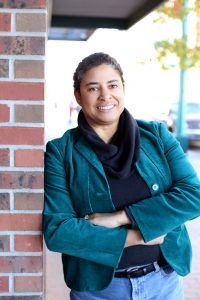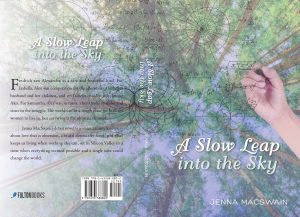 POLICY
POLICY
 POLICY
POLICY
 POLICY
POLICY

Jenna MacSwain
What was it like to be a woman in the early days of Silicon Valley? Exhilarating and brutally sexist, according to one Silicon Valley insider.
Writing under the pen name Jenna MacSwain, the author shares her experiences in her new novel “A Slow Leap Into the Sky,” published by Fulton Books.
The bias in the tech industry is not malicious, but it is insidious, according to MacSwain. The early experiences she documents in her novel occurred back in the tech bubble of the 1990s. But while there has been positive change over the decades, the unequal treatment of women continues.
“There are still so few of us [women engineers],” MacSwain told theCUBE in a recent interview. “Almost none are prominently visible, and those that are prominently visible are too easily dismissed as exceptions.”
MacSwain started her undergraduate degree at the California Institute of Technology, which is represented in the book as the fictional Technology Institute. In real life, as in the book, the school is well-known for being a “boys-only club.” Women weren’t admitted to Caltech until 1970. Even then, the idea was not to include women because of their tech prowess, but to stop the loss of male talent to gender-integrated schools, such as the University of California, Berkeley and Georgia Tech.
In the Swinging ’60s, Caltech students were known as “eunuchs of science” because of their lack of ability to interact with the opposite sex, which was definitely not a good recruitment hook. So, girls were invited not to increase the technical talent, but to encourage a more lively campus social scene. The girls who did join faced harsh pressure and unreal expectations, according to MacSwain.
“In the ’70s and ’80s, Caltech was exceptionally good at taking brilliant young scientific minds and convincing them to drop out and not pursue a degree from anywhere,” she said.
Being a young woman of color, MacSwain faced a double challenge as she started her studies. She left Caltech after two years, but she didn’t give up on her dream to be an engineer. “It’s just who I am. It’s in my DNA,” she said. “From as far back as I can remember, I was in love with the world and in love with trying to figure it out.”
Instead, she moved to the more forgiving culture of UC Berkeley, graduating with a bachelor’s degree in engineering. She even returned to Caltech during the summer, working on DNA sequencing as a research assistant in the early days of the Human Genome Project.
Although she had the potential to continue her academic education, MacSwain chose to become an entrepreneur. At the time, she told people that her choice was a practical one: “I held 13 patents, and had published a paper, and was generally well respected, and I didn’t see how a higher degree would improve on that,” she said.
However, she revealed to theCUBE that the truth was that as a woman, she had no faith that academia would support her. “I believed that graduate school was just an opportunity to get screwed, intellectually, professionally, financially and probably physically,” she said.
Alex, the protagonist in MacSwain’s novel, does decide to continue on to graduate school. In fact, she eventually wins awards for her discoveries in physics. But Alex’s path from freshman to faculty is far from simple. A close escape from date rape and an on-again off-again affair with a married professor are all part of her on-campus experiences.
Continual sexual banter and discrimination remain prevalent even after Alex she leaves the hallowed halls of academia. The frenzied start-up culture of Silicon Valley is shown as a dog-eat-dog world where women are judged on their clothing, venture capitalists flaunt trophy wives, and female brains are considered a sexual aberration. While the storyline and characters in A Slow Leap into the Sky are fictional, MacSwain has experienced similar discriminations in real-life.
“When I asked my boss for a raise and he carefully explained that because he was attracted to me, he couldn’t give me one because it would be unfair to my male colleagues, he truly believed he was acting fairly,” she told theCUBE. “For his generation, what women did was the definition of zero. Even today you see this behavior, where a young woman’s achievements are used to chastise her male colleagues to do better.”
MacSwain was of the first three engineers at Synaptics Inc., and she holds dozens of patents for inventions made during her time with the company. She was a principal software engineer at Oracle Corp. and responsible for the longevity and reliability of Xicor Inc.’s largest non-volatile memory array. She is a tech entrepreneur and founder of two companies: Abalone Entertainment Software and Acaji Inc.
Being an entrepreneur during the early 1990s was a truly unique experience, according to MacSwain, who described the atmosphere as “a tremendous ecosystem of innovation.”
“In 1989, companies were popping into existence as others were winking out. This made for a flow of professional people and a mixing of skill sets, experience and ideas,” she said.
It also gave an unprecedented availability of equipment and resources, as failed startups unloaded equipment and others snapped them up. “I bought workbenches for our integrated circuit testing lab from a warehouse that was like a giant garage sale,” MacSwain said.
Innovation was also free flowing, as new inventions searched for paths to market, and vice-versa. “It only took a phone call with a description of the most speculative of projects to a chip manufacturer to get a spec sheet and free copies of a device newly out of the fab,” MacSwain explained.
Despite the tough road MacSwain knows female engineers will have to follow, she is unequivocal in her support of young women who have a talent for science, math, technology and engineering.
“Bias and discrimination happen. It isn’t your fault. It has happened to all of us in many ways throughout time, but please don’t let it stop you,” she said. “You don’t have to be a warrior, you are already the solution, just you as you are.”
MacSwain has always refused to support the status quo that says women are worth less than men. “I always paid my female employees what I had budgeted for the position, even if the amount they said they were looking for was less,” she said.
Many women make the mistake of accepting lower salaries than the position should pay, according to MacSwain, who advises women to do the background research on what the salary is for a position before accepting an offer. “Because if they start out behind … they are likely to stay behind,” she said.
To most people writing a novel seems a major departure from MacSwain’s current “day job” as a solution architect. However, she would disagree.
“The engineers and scientists that I have known do not make the same distinction between art and science that society at large tends to make,” she said. “Science, engineering and mathematics require creativity. Even the language that technical people use to describe our work, describing theories or equations as beautiful and elegant, for instance, outline that art and science have a common underlying human drive to pursue wonder and to find truth and meaning.”
This link between creativity and technology is important in balancing the gender gap and changing societal norms, according to MacSwain. “We need to consider how the human brain works, and how powerful emergent societal behaviors are, and the nature of non-linear processes,” she said. “As individuals, we have a hard time accepting as normal what we haven’t been habituated to see as normal. We need to normalize equality in the experiences of our children from a very young age.”
Social movements do not progress ever onward and upward, and positive changes — such as the recent Me Too and Black Lives Matter movements — can also cause a powerful backlash as the status quo is challenged.

Hypatia of Alexandria
By telling a fictionalized version of her story through “A Slow Leap Into the Sky,” MacSwain hopes to bring awareness of the real discrimination, and even abuse, that many women scientists, engineers, mathematicians and technologists suffer. Her choice of chapter headings tell a story, as each refers to a scientific theory or famous theorist. The first chapter refers to the Greek mathematician, astronomer, philosopher and teacher Hypatia, who was murdered in the streets of Alexandria while traveling home.
“Alex’s story begs us to imagine that a different ending is not only possible, but some day will be typical,” MacSwain said. “Throughout human history, storytelling has been an effective vehicle for normalizing radical ideas and solidifying social change.”
THANK YOU